|
|
|
Sort Order |
|
|
|
Items / Page
|
|
|
|
|
|
|
| Srl | Item |
| 1 |
ID:
139995


|
|
|
|
|
| Summary/Abstract |
During the quarter century before the First World War, anarchist terrorism was often blamed on the impact of anarchist agitators on naïve immigrants. This article seeks to investigate the truth of this claim, focusing particularly on Italian emigrants, but also looking at some examples of Spanish, French, and Russian emigrants. My conclusion is that, with a few exceptions, radicals emigrated, but emigration did not create radical terrorists. A particularly good example of this can be found by examining the large Italian emigration to Argentina. At most, the emigrant experience may have heightened a pre-existing radicalism or given more precise configuration to its violent expression.
|
|
|
|
|
|
|
|
|
|
|
|
|
|
|
|
| 2 |
ID:
106076
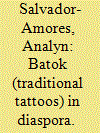

|
|
|
| 3 |
ID:
188175
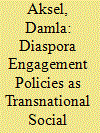

|
|
|
|
|
| Summary/Abstract |
In examining the transformations in statecraft, the existing scholarship on Turkish diaspora policies largely adopts Foucault’s governmentality perspective and suggests that the shifting policies reflect the home states’ attempt to assert control over citizens, not through coercion but rather through consent. While this framing has proved workable, it provides limited room for students of diaspora studies to incorporate the overall conceptualization on the resistance in which the non-resident citizens and countries of residence engage vis-à-vis home country politics and the potential failures of these policies. I propose to follow James Scott’s legibility framework to emphasize that the home states’ evolving policies to engage with non-resident citizens is a social engineering project, aiming to facilitate the state’s ability to monitor and mold the behavior of mobile populations in the context of neoliberal globalization. I argue that the legibility framework allows us to analyze not only the standardization processes, but also the resistance against it both from the migrants and from their countries of residence. To make my argument, I employ the framework to the case of Turkey, which has received considerable attention since the mid-2010s. This article is based on archival research of Turkish state documents on emigration, empirical research conducted between 2013 and 2014 involving nearly 100 interviewees including Turkish state officials in Turkey and with migrant representatives in France and the United States, and further examination of secondary resources, including informal talks with policy makers and diaspora representatives in the post-2016 period.
|
|
|
|
|
|
|
|
|
|
|
|
|
|
|
|
| 4 |
ID:
102420
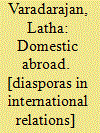

|
|
|
|
|
| Publication |
Oxford, Oxford University Press, 2010.
|
| Description |
vii, 244p.
|
| Standard Number |
9780199733910, hbk
|
|
|
|
|
|
|
|
|
|
|
|
Copies: C:1/I:0,R:0,Q:0
Circulation
| Accession# | Call# | Current Location | Status | Policy | Location |
| 055870 | 305.906912/VAR 055870 | Main | On Shelf | General | |
|
|
|
|
| 5 |
ID:
082879


|
|
|
| 6 |
ID:
155461
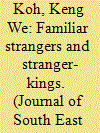

|
|
|
|
|
| Summary/Abstract |
Early modern Malay historiography has been dominated by the history of European trading, colonial empires and local port-polities, often framed along indigenous-versus-foreign lines. Yet, mobility has long been a central feature of this region shaped by commerce, as evidenced by the historical phenomenon of the ‘stranger-king’. This study examines the cultural, political and economic impacts of intra-regional migration and diasporic communities in this region, specifically comparing the interconnected histories of the Chinese, Bugis, Arab, and Minangkabau communities in the seventeenth and eighteenth centuries. Locating this history within that of maritime Asia, this study provides a nuanced understanding of the historical Malay world beyond essentialism and communalism. This article highlights why scholars of the Malay world should take into account the important roles of mobility and ‘strangers’. It concludes that the Malay world was not a timeless or natural construct, but one whose contours and identity were continually shaped by significant diasporic communities and historical encounters.
|
|
|
|
|
|
|
|
|
|
|
|
|
|
|
|
| 7 |
ID:
182932


|
|
|
|
|
| Summary/Abstract |
The world today is profoundly interconnected, but also characterized by ongoing national competition and intra-state conflict. At the nexus of these dynamics is the question of cross-border mobility, which cuts through and connects myriad, disparate areas of “entangled” security—from pandemics to climate change, to conflict and military engagement, to challenges to democracies in the form of internal polarization and external threats. The COVID-19 pandemic provides a striking illustration of this “global security entanglement” in action. This essay presents the concept of security entanglement, illustrates how it operates, and explores some of its theoretical and practical implications.
|
|
|
|
|
|
|
|
|
|
|
|
|
|
|
|
| 8 |
ID:
092296
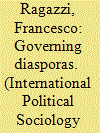

|
|
|
|
|
| Publication |
2009.
|
| Summary/Abstract |
The study of migration in general and in IR in particular has generally meant the study of immigration. Yet, sending states increasingly manage and govern numerically impressive "diasporas" abroad. This article assesses the importance of the government of emigrants and diasporas, and reviews the meager theoretical literature on the topic. It then proposes a theoretical framework based on the concept of governmentality and outlines some avenues for further research.
|
|
|
|
|
|
|
|
|
|
|
|
|
|
|
|
| 9 |
ID:
084900
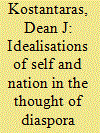

|
|
|
|
|
| Publication |
2008.
|
| Summary/Abstract |
Diaspora intellectuals have often played prominent roles in the formation of national revival and independence movements. This article explores the factors that may help to explain this phenomenon through a survey of the literary responses of intellectuals from Eastern Europe, colonial Africa and Asia to their experiences in the capital cities of Western Europe over the early modern and modern era. These reactions, expressed through the writings of influential figures such as Adamantios Koraes and Leopold Senghor, reveal, in their thematic convergence, aspects of such encounters that have remained consistent over time. Portrayed throughout are the emotional hardships of talented individuals who found their status suddenly conditioned by the ideas associated with their places of origin in the host society's imagination. Unwilling, for reasons explored below, to submit passively to these affronts, the individuals studied here threw their energies instead into ambitious projects of national re-imagination and rehabilitation. The article makes use, finally, of the rather visceral quality of the literature surrounding the experience of diaspora intellectuals to account for the complex weave of modern and traditional elements often exhibited in the new idealisations of self and nation that appear throughout their works.
|
|
|
|
|
|
|
|
|
|
|
|
|
|
|
|
| 10 |
ID:
132524
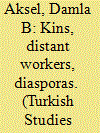

|
|
|
|
|
| Publication |
2014.
|
| Summary/Abstract |
This paper analyzes the politics of the Turkish state about "Turks abroad" as a process of defining the status of and constructing the perceptions about its transnational members. Falling back on transnationalism and diaspora studies, it aims to bring together the policies of the Turkish state regarding emigrants and co-ethnics who have been stranded during the collapse of the empire from which the modern state emerged. From the point of view of the sending state/external homeland, it compares the different trajectories and policies which have been put in place during different periods, and traces the parallel actions which have been taken over the last two decades regarding both constellations. The paper also investigates the way in which the extra-territorial membership is constructed and defined-by putting emphasis on its fluidity over time as a result of endogenous and exogenous factors.
|
|
|
|
|
|
|
|
|
|
|
|
|
|
|
|
| 11 |
ID:
190982
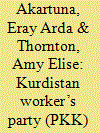

|
|
|
|
|
| Summary/Abstract |
Overseas diasporas have long been exploited by terrorist organisations seeking funding and support from areas beyond their operation. The Kurdistan Worker’s Party (PKK), active in south-eastern Turkey, is no exception and maintains a significant international presence. This paper uses seventy-three survey responses and thirteen interviews amongst London’s Turkish and Kurdish diaspora to provide an original and comprehensive insight into the PKK’s overseas operations, including their offending patterns, methods, hotspots, offender/victim profiles and existing countermeasures. Respondents were also consulted on new community-based prevention measures designed to address limited law enforcement responses and the laissez-faire approaches of diaspora host countries. This strategy, which combines crime science and behavioural economic theories, consists of Clarke’s “Situational Crime Prevention” theory and Thaler and Sunstein’s “Nudge” theory (SCP+N). The results indicate that the PKK creates criminal opportunities by “legitimising” itself across diasporas by invoking ideological sympathy and social dependence (conceptualised as “constructed legitimisers”), ensuring minimal resistance to its activities. SCP+N is motivated as an effective counterstrategy, addressing both the rational and impulsive nature of offending. The overall theoretical contribution of this paper is to assess overseas terrorist financing through a prevention-oriented, situational and behavioural framework, and to propose a community-based strategy to effectively counter such activities.
|
|
|
|
|
|
|
|
|
|
|
|
|
|
|
|
| 12 |
ID:
022042
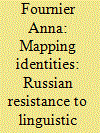

|
|
|
|
|
| Publication |
May 2002.
|
| Description |
415-433
|
|
|
|
|
|
|
|
|
|
|
|
|
|
|
|
| 13 |
ID:
106071
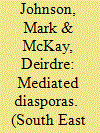

|
|
|
| 14 |
ID:
069185
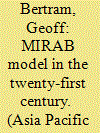

|
|
|
| 15 |
ID:
076020
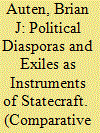

|
|
|
|
|
| Publication |
2006.
|
| Summary/Abstract |
In achieving their own political goals, states-including great powers-have looked to political exiles (people residing outside of their home country who harbor political grievances with those who are currently in power "back home") and their respective organizations as instruments of grand strategy. Historically, states have used exiles in three ways: (1) intelligence collection, (2) recruitment and execution of paramilitary operations, and (3) information operations. The article details how internal organizational splits, differences of strategic culture, and competing thoughts about overall political goals can make the grand-strategic use of exiles a complex endeavor.
|
|
|
|
|
|
|
|
|
|
|
|
|
|
|
|
| 16 |
ID:
079904


|
|
|
|
|
| Publication |
2007.
|
| Summary/Abstract |
The structural components of a state are regularly conflated with a state's national identity. In reality, however, the assumption that the boundaries of a state and its national identity are coterminous is problematic. While this has always been the case, changes in the ability of actors in the international system to use communication and transportation technologies to sustain transnational collective identities points to the need for new empirical research in this area. Contemporary diasporas are defined by a national or cultural identity, yet differ from nation-states in terms of their organizational and spatial logics. By comparing diaspora mobilization in two cases, we find that both non-state political entrepreneurs and state elites are using diasporic practices of identity formation as a means of generating economic and political support in an increasingly integrated global economy. This points to discontinuities between a territorially defined states system and deterritorialized practices of collective identity formation.
|
|
|
|
|
|
|
|
|
|
|
|
|
|
|
|
| 17 |
ID:
143598
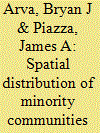

|
|
|
|
|
| Summary/Abstract |
Qualitative studies of terrorist movements frequently highlight the importance of diaspora communities as important factors in producing and sustaining terrorist activity in countries. The underlying theoretical argument is that bifurcation of tight-knit minority communities between countries nurtures separatist or irredentist sentiments among affected community members, thus prompting terrorist activity, while minority community members in other countries might mobilize financial and political resources to support terrorist activity among their compatriots. In this study, we empirically test whether transnational dispersion, versus domestic concentration, of minority communities in countries produces higher incidents of terrorism. Conducting a series of negative binomial estimations on a reshaped database of around 170 countries from 1981 to 2006, derived from the Minorities at Risk database and the Global Terrorism Database, we determine that both transnational dispersion of kin minority communities and domestic concentration of minorities within countries increase terrorism and that transnational dispersion is a particularly robust predictor of terrorist attacks.
|
|
|
|
|
|
|
|
|
|
|
|
|
|
|
|
| 18 |
ID:
114061
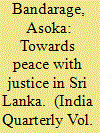

|
|
|
|
|
| Publication |
2012.
|
| Summary/Abstract |
Since the end of the armed conflict and the defeat of terrorism in May 2009, the international movement to establish Tamil political autonomy in Sri Lanka's Northern and Eastern regions has intensified. The faction of the Sri Lankan Tamil Diaspora which leads the separatist struggle has declared a virtual 'Transnational Government of Tamil Eelam'. Tamil politicians on the island, the 'international community' and India are all calling for maximum political devolution along the lines of the 13th Amendment to the Sri Lankan Constitution introduced following Indian intervention in 1987. This article juxtaposes the growing demands for secessionism and devolution with demographic and ground realities in Sri Lanka and the need for policies that are responsive to the needs and interests of all communities on the island. The article considers calls for a national referendum on devolution, the district as the unit of devolution and changes needed beyond devolution at the local, regional and international levels.
|
|
|
|
|
|
|
|
|
|
|
|
|
|
|
|
| 19 |
ID:
163246
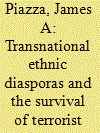

|
|
|
|
|
| Summary/Abstract |
What effects do transnational ethnic diaspora communities have on the terrorist organizations with which they are linked? Are diaspora-linked terrorist movements more resilient and longer lived? What types of diaspora support affect terrorist survival? Finally, do diasporas affect peaceful resolutions of terrorist campaigns? Using data on 586 terrorist movements during the period 1970–2007, this study finds that movements linked to transnational ethnic diasporas are more resilient. They are significantly less likely to end, particularly through counterterrorism force, and this seems to be a product of diaspora provision of material support rather than diaspora political and propaganda efforts. Finally, diasporas seem to have a negative impact on political resolution of terrorist campaigns, as diaspora-linked terrorist movements are also significantly less likely to end by entering into a political process.
|
|
|
|
|
|
|
|
|
|
|
|
|
|
|
|
| 20 |
ID:
154733
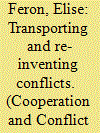

|
|
|
|
|
| Summary/Abstract |
Like other types of diaspora groups, conflict-generated diasporas display a strong attachment to their countries of origin, and structure their identities and ideologies around discourses referring to their homeland. However, their inner cleavages, born out of the conflicts raging in their home countries, can run very deep. The maintenance of their ethnic, religious, linguistic or political divisions even generations after the migration process has taken place sometimes leads to conflict transportation processes, whereby the conflicts raging in their home countries are reproduced and maintained in countries of settlement. Incidents opposing rival diaspora groups are thus often interpreted as a prolongation or reproduction of core conflicts raging in their regions of origin. Against this assumption, this article argues that if transported conflicts often formally take the shape of core conflicts, and emulate them by using the same language, symbols and ethnic/religious/linguistic categories, they are also deeply transformed by the migration process itself. In this perspective, this article explores the transformation and reinvention of conflict-generated diasporas’ politics, and proposes to look at the autonomisation processes they display vis-à-vis the core conflicts, in terms of content but also of objectives, ultimately generating a drift at the political and organisational levels.
|
|
|
|
|
|
|
|
|
|
|
|
|
|
|
|
|
|
|
|
|